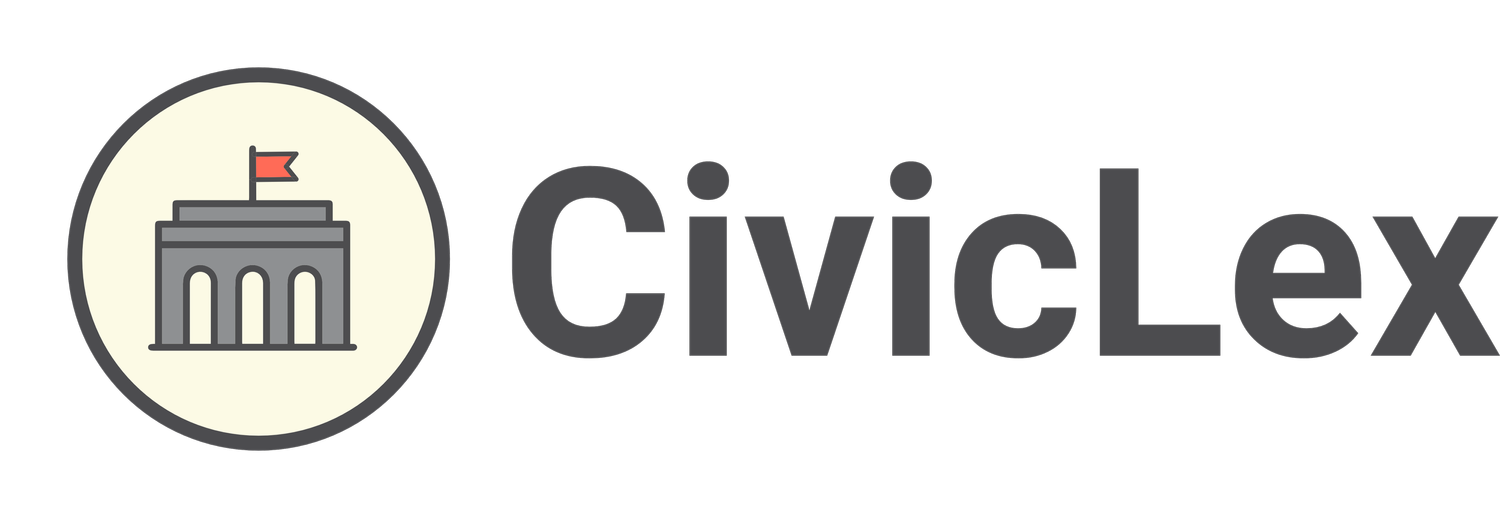
Understanding the City Website
Lexington-Fayette Urban County Government's (LFUCG) website is a great resource, but can be overwhelming.
This unit is built for you to understand a few ways that the LFUCG website can help you connect with what is happening in city government.
How to Use the City’s Website: an Overview
Search Box
The search box on the city's homepage can be helpful, but it sometimes returns irrelevant results. Make sure to be specific with your search terms.
Menu Page
The Menu Page, accessed via the menu button, breaks down the city's website into eight sections. Each section is then divided into subsections that will take you specific items you may be looking for. We find that the menu system is the easiest way to navigate the city's website.
Footer & Top line Menu
In addition to the Menu page and search bar, there are two other ways to find information that you should know about.
A few specific items are only accessible through a menu at the bottom of most pages. These include:
Open Data Portal
Maps
Lex TV
The most commonly used resident services for the City are also highlighted along the top of the page, usable from most pages. If you can't get them to work, go back to the home page and try them there. These include:
Traffic Updates
Paying your LEXserv bill
LFUCG Jobs
Submitting a 311 Service Request
How to Find and Contact Your Neighborhood Association
Neighborhood Associations are an essential part of how LFUCG interacts with its residents. With your neighborhood association, you can find out about zoning changes, start local improvement projects, advocate for your neighborhood to the city, and connect with community members - so make sure you know which neighborhood association you are a part of and who is in charge of it!
You can find your neighborhood association with the following steps:
Go to lexingtonky.gov and scroll to the LexFind box
Type your address into the bar and hit enter
View your Neighborhood Association on the right side of the screen*
*In some cases, on address can be a part of more than one Neighborhood Association. In this case, the city website lists the smallest association that the address is a part of.
To learn more about your Neighborhood Association, including who is in charge of it and how to contact them, you have to take a couple more steps
In the search bar at the top of the page, type in “neighborhood associations”
Click on the first link, find your neighborhood association
Type the name of your neighborhood association into the small search bar midway down the page, or select it from the list. This should list the primary and secondary contacts for your association, your council district, and your association’s website (if it has one).
How to Apply for a Job With the City
Along the top of the page, there is an option called “Jobs”.
Clicking "Jobs" takes you to “Current Job Openings Page”, where you can look at jobs in specific departments, see LFUCG’s policies, and find helpful resources.
If you click on “Browse all job opportunities”, this will take you to the Careers site, where you can search, save and apply for jobs or create and sign in to your account. At the top, there is a search bar you can use if you are looking for a certain type of job, or you can click "View All Jobs" to browse what's available.
Then you will see a list of job postings. Clicking on the name of the job won't take you to it; to view the full description and apply, click the arrow button to the right of the posting.
On the next page, you can scroll down to read about the duties, pay, qualifications and application deadline for the job. There is an "Apply for Job" button in the upper right corner, but before clicking it, make sure to look for a "How to Apply" or "Special Instructions" section in the description. Some job postings will direct you to apply another way, such as emailing your resume, going to the department in person, or following a link to a department-specific web page. If you do use the "Apply for Job" button, you will need to sign in, or register a new account if you don't have one. An account will let you apply, check the status of your application, save job postings to come back to later, etc.
How to Resolve a Dispute with the City
If you have a specific problem, a public comment at a city council meeting may not be the best place to report it. It is usually more effective to route it to someone who works on that specific issue.
The city has a few bodies that work on resolving certain types of disputes.
You first stop should be 311. LexCall 311 is the city’s resource for most things that are public-facing city services. This includes garbage collection, potholes, trash and debris, street signs and other city services. You can either call 311 toll-free, or submit a request online. We seriously can’t recommend 311 enough.
The Human Rights Commission is for discrimination in employment, housing and public accommodation. Public accommodation is anything open to the public, such as a restaurant, store, government office, city bus or hospital.
The Police Department accepts formal and informal complaints about interactions with officers.
Informal Complaints
Can be made anonymously
Submit online at https://www.lexingtonky.gov/public-integrity-unit or call (859) 258-3625
Formal Complaints
Require an affidavit, which is the written version of being under oath, and must be notarized
Are investigated by the Investigated by the Public Integrity Unit (PIU)
To file a formal complaint, you must go in person and sign an affidavit at either the County Clerk’s Office or the City’s Public Integrity Unit, which is housed in the downtown police station
All policies on complaints and discipline can be found here, and general police policies are available here
The Telecommunications Officer can help with complaints about cable providers if talking directly to the cable provider doesn’t resolve the problem.
Call LexCall at 311 or (859) 425-2255
More information at https://www.lexingtonky.gov/lexington-cable-franchises
Issues that don’t fit any of these categories can be addressed to your council member by phone or email. This gives them a record of your complaint so they can follow up on it more easily than they could if you said it in a council meeting.
Public Information
Open Records Requests
You can request records from the city online, by fax, or by mail, or email. Emailed requests should be sent to the email address the agency lists.
Public agencies have 5 business days to respond, not counting the day they receive the request. If your request is time-sensitive, it may be better to submit it online or by fax, so you know they will receive it the same day you send it.
Certain departments keep their own records, so requests must be sent to them directly.
Only residents of Kentucky can make an open records request. You will not be asked to provide identification or proof of residency, but you will have to state if you live, work, or own a business or property in Kentucky. Nonresidents may make open records requests, but those requests may be rejected or delayed.
Here is a cheat sheet for changes made to open records requests in 2021.
Open Data Portal
The city maintains a wealth of public data
With mapping software, this data can be used to make maps of Lexington’s streets, parks, libraries, hospitals, schools, voting precincts, zoning, waterways, tree canopy, floodplains, and more.
Legistar: What is it and how can you use it?
Legistar is a database housing the city’s calendar for city government meetings and other information about them. This type of calendar is called a docket and you’ll often hear about a meeting being on the docket, or a request for an item to be included in it. You can find Legistar by going to the city’s website, clicking the Government tab from the general menu, clicking Public Meetings and Notices from there, then clicking the Council Meetings and Dockets title. You should see the link to Legistar on that page.
Once you’ve accessed Legistar, you’ll see a list of tabs across the top left of the screen:
If you click the Legislation tab: you can search for legislation discussed in council or committee meetings. You can find these numbers in Council meeting packets. It’s a helpful resource to keep track of legislation as it moves through different committees or meetings, or to read more about past legislation.
If you click the Calendar tab: you can find council and council committee meetings in either a list or calendar view. You’ll see the meeting times and locations, you can read more about the meeting in the Details section (which has the legislation numbers referenced in the meeting), read agendas and minutes, and access videos of meetings, if available. You can search for meetings that have already happened with the search tool
If you click the City Council tab: you can find out who the council members are, what committees they’re involved with, and any board or commission vacancies.
If you click on the Meeting Bodies tab: you can click on the department names to find their members.
If you click on the Boards and Commissions tab: you can click on each council member’s name to find out which commission or meeting body they participate in.



